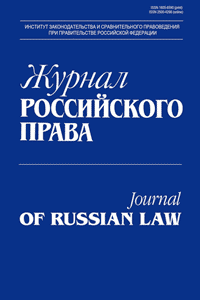Selecting the direction of the national legal system development is a topical scientific and practical issue under the conditions of complex globalization processes and legal systems integration. The course of the national legal system development should be determined through the establishment of its social coordinates and subsequent identification. For this purpose, it is necessary to outline the place of the national legal system within a higher-level system – the system of social regulation — to isolate and characterize the types and elements of the system of social regulation, which can be considered as social coordinates of the national legal system. The issue is studied using dialectical, historical and structural-functional methods of scientific research. Social coordinates of national legal systems are the right-centrist, religious-moral and political-centrist types of social regulation, each of which consists of seven elements: 1) generating element (renewal and renovation) of social regulation – social practices; 2) program-target (ideological) element; 3) information-evaluative element; 4) regulatory element (regulatory system); 5) the element of individual regulation of public relations; 6) element responsible for the preservation and transmission of social regulation; 7) element responsible for the protection of social regulation system and for monitoring its status. The analysis of the identified types and elements of the system of social regulation suggests that the Belarusian legal system is within a coordinate system of political-centrist type and is developing towards the legal system of the East Slavic type.
system of social regulation, social coordinates, types and elements of social regulation system, national legal system, identification and course of the national legal system development.
1. Afanas´ev V. G. Sistemnost´ i obshchestvo. M., 1980.
2. Baranov V. M., Polenina S. V. Sistema prava, sistema zakonodatel´stva i pravovaya sistema: lektsiya. N. Novgorod, 1999.
3. Boroday Yu. Totalitarizm: khronika i likhoradochnyy krizis. Nash sovremennik. 1992. № 7.
4. David R. Osnovnye pravovye sistemy sovremennosti / per. s fr. i vstup. st. V. A. Tumanova. M., 1988.
5. Drobyazko S. G. Sovremennoe pravoponimanie i ego aktsenty. Stepan Grigor´evich Drobyazko: k 90-letiyu so dnya rozhdeniya S. G. Drobyazko. Minsk, 2013.
6. Lazarev V. V., Lipen´ S. V. Teoriya gosudarstva i prava: uchebnik dlya bakalavrov. 4-e izd. M., 2012.
7. Mezhevich N. Ot Atlantiki do Tikhogo okeana. Ozhidat´ li sblizheniya ES i EAES?. Zvyazda. 2015. № 237.
8. Osnovy sotsial´noy kontseptsii Russkoy Pravoslavnoy Tserkvi. M., 2000.
9. Po zakonam ekonomiki i zhizni: vse predlozheniya MVF prinimayutsya, no vyrabotannaya sistema sotsial´nogo gosudarstva ostaetsya. Zvyazda. 2015. № 223.
10. Sil´chenko N. V. Problemy predmeta pravovogo regulirovaniya. Gosudarstvo i pravo. 2004. № 12.
11. Sinyukov V. N. Rossiya v KhKh1 veke: puti pravovogo razvitiya. Zhurnal rossiyskogo prava. 2000. № 11.
12. Sistemnyy podkhod i printsipy deyatel´nosti / redkol. I. V. Blauberg, V. P. Zinchenko, N. G. Kristur´yan, V. N. Sadovskiy; sost. A. P. Ogurtsov, B. G. Yudin. M., 1978.








